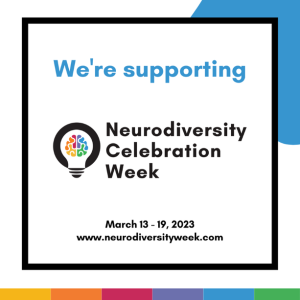
A staff member from Cumbria, Northumberland, Tyne and Wear NHS Foundation Trust (CNTW) is sharing their experience of autism to celebrate Neurodiversity Celebration Week (13 – 19 March 2023), a worldwide initiative that aims to challenge stereotypes and misconceptions about neurological differences:
Growing up I was known for my blunt and direct way of speaking. People who knew me always commented that I had a habit of ‘calling a spade a spade’. This was at times seen as me being rude and people would ask me to consider changing how I spoke to be more accommodating of other people’s feelings. This would confuse me as I always thought speaking plainly is the best thing to do. There could be no room for misunderstandings then and everyone would know where they stood.
I was also known for being passionate and having very strong opinions. At times I would feel like I had to correct people who were saying something incorrect to ensure that everyone around me had the same information as me. Again, I was asked to stop doing this, to be less rigid in my beliefs and not always correct people. At time this made me feel alienated from others. I couldn’t understand why people wouldn’t want to be given the correct information. Or why they didn’t view me sharing my knowledge as a positive-a way for everyone to learn from each other.
When I received my autism diagnosis, I cried tears of relief. I felt validated for the first time in my life. The practitioner who gave me my diagnosis was confused and assumed that I thought this diagnosis was a negative. However, for me it was a confirmation that I am not the person people perceived me to be.
When I received my autism diagnosis, I cried tears of relief. I felt validated for the first time in my life. The practitioner who gave me my diagnosis was confused and assumed that I thought this diagnosis was a negative. However, for me it was a confirmation that I am not the person people perceived me to be. There was a reason why I always felt like I was doing something wrong, why I could never connect with people as easily as others around me could.
When I began to share my diagnosis, I heard the phrase “you don’t look autistic” from many people around me. I understand their sentiment because for many years of my life I never considered it to be a possibility either. However, autism doesn’t have a ‘look’, you can’t tell someone is autistic by looking at them and every autistic person looks and presents differently. There is a reason it is called a ’spectrum’ and this not a linear experience like most people believe. In fact, it is now viewed more like a wheel in which each autistic person has differing strengths and difficulties.
Autism doesn’t have a ‘look’, you can’t tell someone is autistic by looking at them and every autistic person looks and presents differently. There is a reason it is called a ’spectrum’ and this not a linear experience like most people believe.
So, for this Neurodiversity Celebration Week I would like to say that the same areas that people view as my weaknesses are actually some of my greatest strengths. I am passionate and knowledgeable, and I enjoy sharing that with people. This passion allows me to excel at my job and show people exactly why I love my job so much. My directness and openness allow me to connect with people around me and with the people that I support. I am seen as someone trustworthy because of how I communicate. I am proudly autistic, it cannot be separated from me in any way and therefore, I do look autistic.
Find out more about neurodiversity on the Neurodiversity Celebration Week website.
